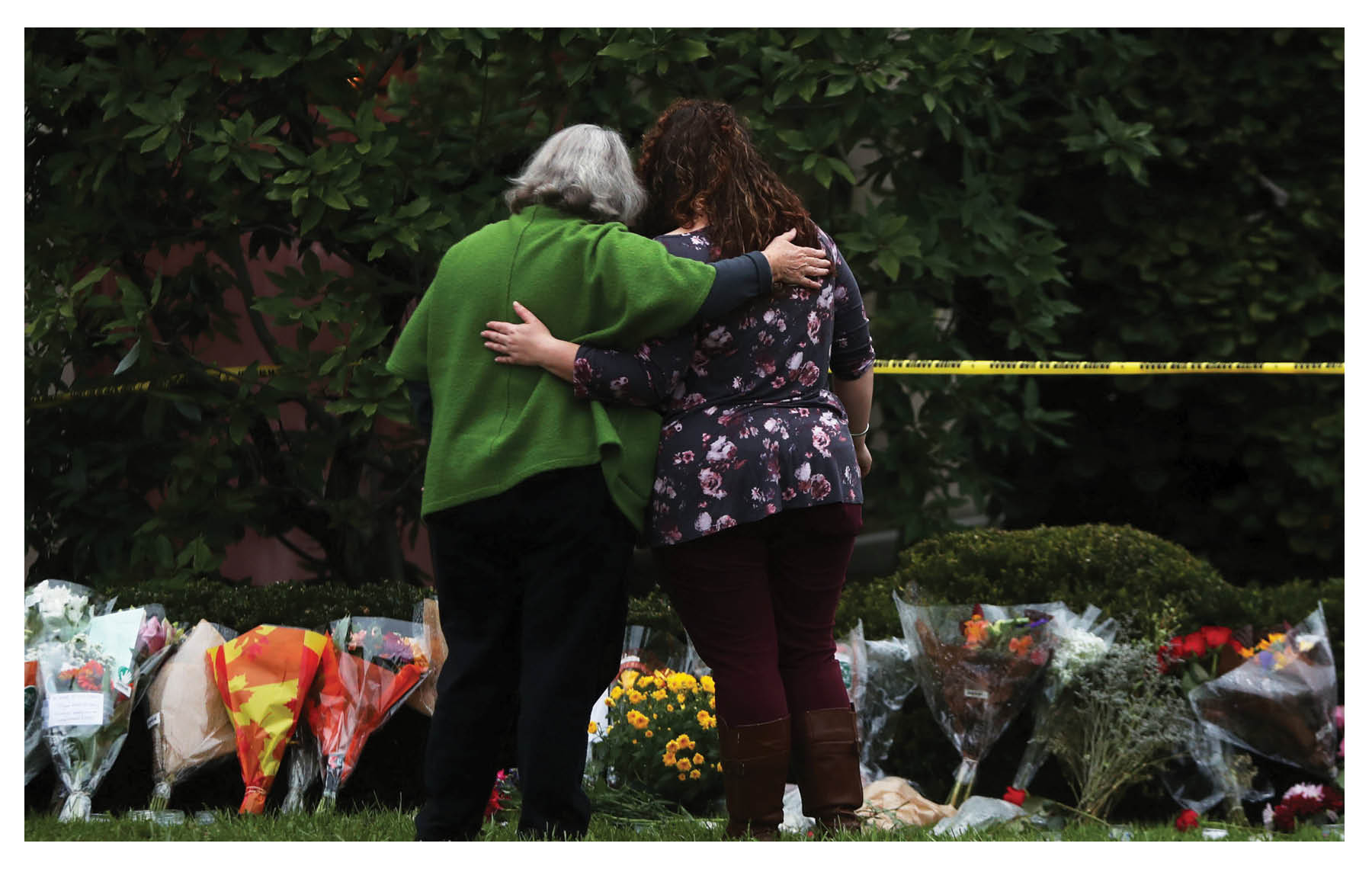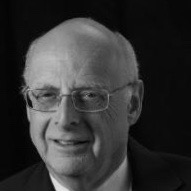

The gunman who struck Pittsburgh’s Tree of Life Synagogue on Shabbat indicated online that he wanted to “Kill all Jews.” During prior events — whether at our country’s southern border, on the streets of Charlottesville, or at political rallies sponsored by our president — Jews have been mostly passive observers to this nation’s changing political scenarios. However, the assault on worshippers that took place on that Shabbat morning in Squirrel Hill was a direct attack on Judaism and America’s Jews. It was the single most violent incident against Jewish Americans in the history of the United States.
In a society already under assault by the politics of hate, the mass murder in Pittsburgh is but one more indication that a war is underway for America’s soul. Where America and Americans once celebrated differences, today there is a conscious and deliberate effort to intimidate and seek to silence those who represent different religious, sexual and political beliefs and practices. Violence is replacing civil discourse. As a result, anti-Semitism has become a manifestation of a fundamental disregard for the respect for diversity. In this new and uncertain political environment, Jews have become political targets.
It is cynical for politicians to offer words of comfort in the aftermath of violence when their own rhetoric, framed in nationalistic imagery, seeks to question the loyalty of certain Americans; and when their political operatives single out individuals, suggesting that they are the cause of America’s troubles. In this type of political culture, sadly, violence and hate will be manifested on our streets.
“The synagogue attack has introduced a number of challenging issues involving, in particular, gun violence, the discourse of politicians who need to be held accountable for the words they employ, and the use of social media to convey hate messaging.”
A year ago, I offered the following perspective:
“A fundamental political sea change appears to be underway. As America’s social fabric is being tested, new strains of anti-Semitism and anti-Zionism have emerged globally and at home. … There is a heightened awareness among Jews of extremist expressions challenging not only the existing democratic norms of the nation but also reflective of how minority communities, including Jewish Americans, are being categorized and threatened.”
The Jewish Contract With America
The American Jewish story is unique in the annals of our historic journey and is worth revisiting. While today’s social and political environment is not the first time in American Jewish history that we have experienced a sense of discomfort and political uncertainty, we should remind ourselves that Jews have been a part of the American experiment in democracy since this nation’s founding. We have come to understand that America is a fundamentally different type of society. “American exceptionalism” was built around the symbolic idea of a “Jewish contract” that ensured religious freedom and promoted political security. Unlike many other societies in which Jews have resided, the United States has been the only nation without a history of state-sponsored anti-Semitism.
The constitutional principles of American democracy have clearly enabled and shaped Jewish political engagement. Among the underpinnings basic to this nation’s creation was the commitment of its Founding Fathers to ensure religious liberty, nurture political discourse and promote church-state separation, as referenced in the First Amendment. Similarly, Article Six of the Constitution contains a further political safeguard, as it prohibits any form of a “religious test” as a qualification to holding public office.
Over time, historical events created a type of mythology concerning Jewish participation in American society, suggesting a special connection between America and its Jewish citizens. This is no better affirmed than with the presidency of George Washington. In tribute to his election, the Jewish congregations of the new republic issued a series of congratulatory letters. In response, Washington wrote this defining message to the Jewish community of Newport, Rhode Island:
“For happily the Government of the United States, which gives to bigotry no sanction, to persecution no assistance, requires only that they who live under its protection, should demean themselves as good citizens.”
And Washington’s concluding paragraph then perfectly expresses the ideal relationship between the government, its individual citizens and this nation’s religious communities:
“May the children of the stock of Abraham, who dwell in this land, continue to merit and enjoy the good will of the other Inhabitants; while every one shall sit under his own vine and fig tree, and there shall be none to make him afraid.”
Washington’s letter represents one of the most extraordinary statements defining the ideals associated with American society and serves as an important element of this symbolic notion of a “contract” between the Jewish community and this nation.
Over time, other statements and defining actions would add to this contractual understanding. During the Civil War, Lincoln’s decision to order the rescinding of General Grant’s Order Number 11 represented another such example. Grant’s directive would have required Jews living in the Tennessee River Valley to leave their homes and sacrifice their livelihoods. It marked the only time in American history in which Jews would be singled out for political retribution by the government.
American Jewry has so identified with the key social norms and political symbols of this society that, from the outset, Jewish institutions reflected not only the core terminology of American society but also the structural characteristics of the federal government system itself. For example, various organizations have taken on names with symbolic references to the political ideals of this country: United Jewish Communities, American Jewish Congress, United Synagogue of America (USA), and the Union for Reform Judaism.
Similarly, the governance and structural functions of Jewish institutions reflect two core elements central to American democracy: the introduction of a federalist system involving national, regional, state and local levels of governance and the presence of a separation of powers arrangement involving the distribution of roles and responsibilities.
“This is a time to reassert the civic principles that convey the American story. We owe it to Pittsburgh’s victims of anti-Semitism and to ourselves.”
The Rise of External Threats
Over the course of American history, Jews have faced various challenges to their political status and well-being. With the rise of the Ku Klux Klan in the second half of the 19th century and the emergence of overt anti-Semitism in the early decades of the 20th century — in part promoted by the publications of Henry Ford and the radio messages of Father Charles Coughlin — an era of political and social upheaval left many Jews feeling uncertain and insecure. University quotas, discriminatory hiring practices and restrictions on selling homes to Jews reflected the tenor of the times.
The years following World War II redefined some of the challenges facing American Jewry in shaping their role as a minority community within a larger culture. The new realities of the presence of a Jewish State, along with the heightened visibility of Jews within American society, challenged Jewish Americans to reaffirm their loyalty to this nation. In 1950, Ethel and Julius Rosenberg were found guilty of conspiracy to commit espionage. The charges related to the passing of information about the atomic bomb to the Soviet Union. The political witch-hunts for communist sympathizers conducted by Senator Joseph McCarthy and the activities of the House Committee on Un-American Activities during the 1950s raised concerns about an increase in anti-Semitism.
If the 1950s can be perceived as a decade marked by a level of fear, then the 1960s witnessed the emergence of a heightened sense of political engagement and activism. Jews played key roles in the liberal, progressive agenda of the civil rights struggle and as activists within the Vietnam anti-war movement. With this increased participation came new questions regarding how far Jews could publicly embrace controversial policies without endangering their self-interests and the community’s well-being. Even the divisions within the community over specific domestic and foreign policy matters were perceived as testimony to their greater sense of civic assuredness and security.
Moving Forward
Indeed, in the context of the recent bloodshed and horror of violence directed against Jewish Americans, and in light of the data showing a significant rise in hate crimes and social media threats, many issues are emerging. A different political reality faces this nation in the aftermath of Pittsburgh, as hate has gone mainstream. The bottom line remains: Will Jews and others feel safe in this country?
The synagogue attack has introduced a number of challenging issues involving, in particular, gun violence, the discourse of politicians who need to be held accountable for the words they employ, and the use of social media to convey hate messaging. These and other policies and practices define who we are and what it may mean to be an American.
Fear and intimidation must not be allowed to silence Jews or others. In connection with American Jewish experience, Jews have become an essential and highly visible element within the structure and culture of this society, deeply embedded in its body politic. Jewish Americans express themselves through competing political lenses, embracing liberal ideology as framing Jewish and universal values and also by defining political engagement through interest-group politics, specifically defending and embracing Jewish self-interests. In the aftermath of Pittsburgh, Jews will need to assert a shared response.
This is a moment that demands a serious conversation among Americans about the state of our nation and the collective interests and common values that bind us together. This is a time to reassert the civic principles that convey the American story. We owe it to Pittsburgh’s victims of anti-Semitism and to ourselves.
Sadly, bigotry and hate have always been present within American culture. The political genius that shaped this society has enabled responsible voices to step forward to manage the nation’s political messiness, fix its failures as a democracy, and respond to periods of hate rhetoric and social violence. At each turn, these individuals from within our government, our press or our religious establishments, in association with the collective conscience of our society, have stepped forward to recalibrate both the messages and the practices that define what it means to be an American and to be part of this nation.
The task of reframing the American story must happen yet again, for the sake of the Tree of Life victims and for the sake of our great nation.
Steven Windmueller is the Rabbi Alfred Gottschalk Emeritus Professor of Jewish Communal Service at HUC-JIR, Los Angeles.






















 More news and opinions than at a Shabbat dinner, right in your inbox.
More news and opinions than at a Shabbat dinner, right in your inbox.